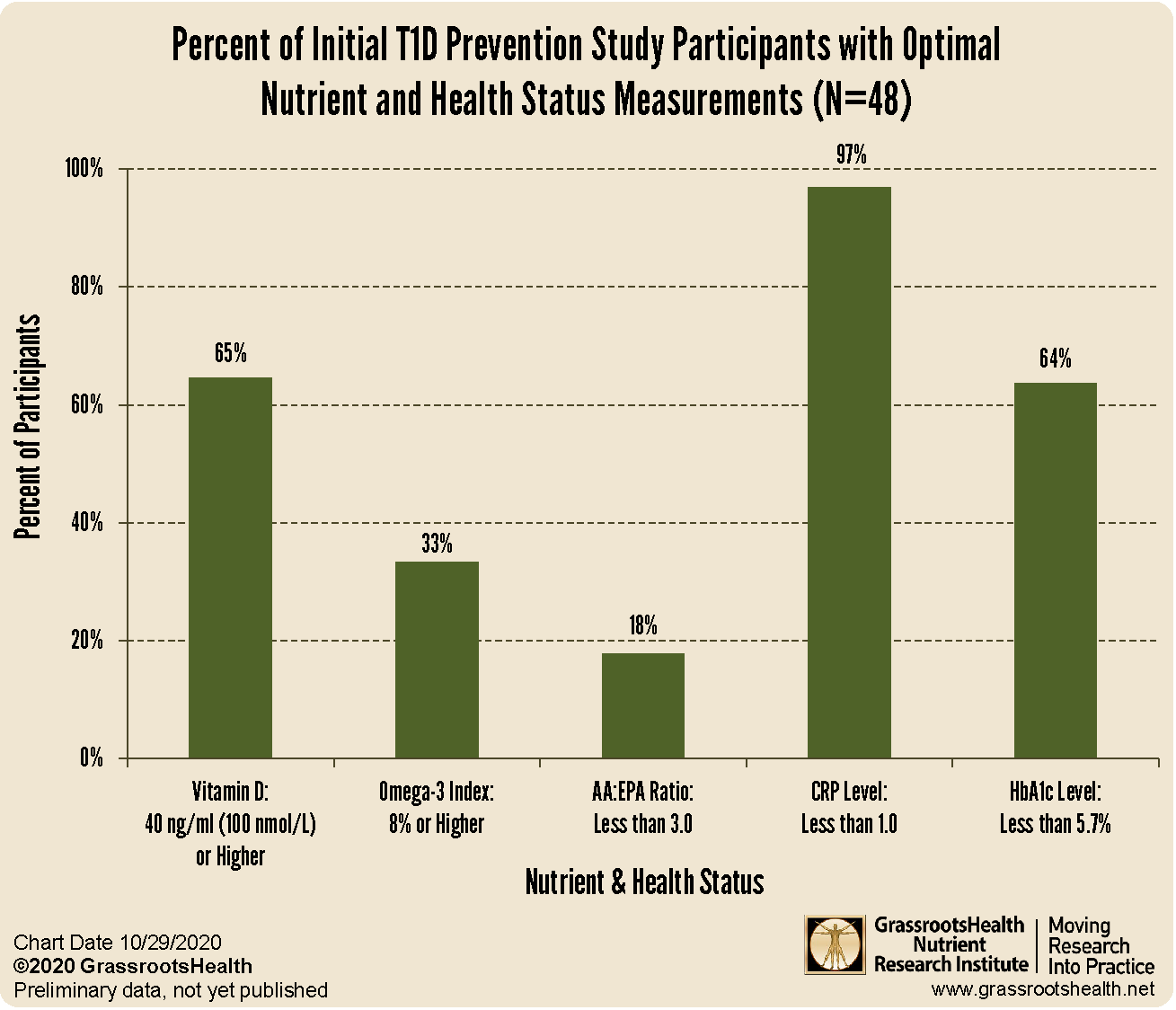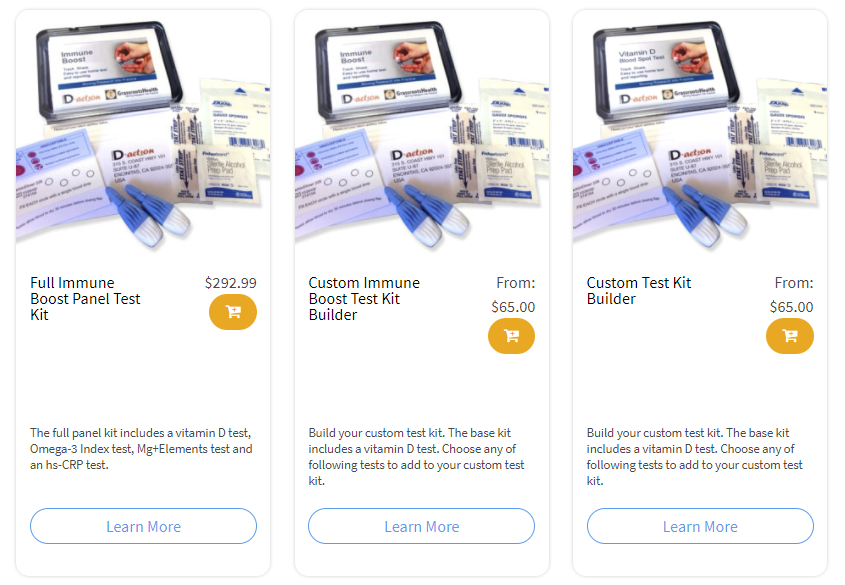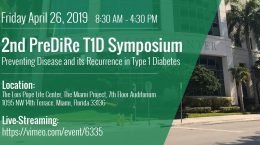Published on November 3, 2020
GrassrootsHealth Vitamin D & Omega-3 Study on Prevention of Type 1 Diabetes
November is American Diabetes Month! In today’s post you’ll find information about GrassrootsHealth’s Type 1 Diabetes Prevention project.
What is Type 1 Diabetes?
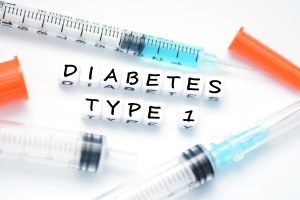 Type 1 diabetes (T1D) is a chronic autoimmune disease characterized by the destruction of insulin-producing pancreatic beta cells which affects approximately 1.25 million people in the United States. Studies have linked a higher vitamin D and omega-3 status with lower T1D risk. This may be due to the anti-inflammatory properties of vitamin D and omega-3s since chronic inflammation has also been associated with the development and progression of T1D. To investigate the combined effect of these nutrients on inflammation and T1D prevention, GrassrootsHealth is running a study for individuals at a high risk for T1D, including those who are positive for auto-antibodies (i.e. immune system molecules that attack insulin producing cells) or have a close family member with T1D.
Type 1 diabetes (T1D) is a chronic autoimmune disease characterized by the destruction of insulin-producing pancreatic beta cells which affects approximately 1.25 million people in the United States. Studies have linked a higher vitamin D and omega-3 status with lower T1D risk. This may be due to the anti-inflammatory properties of vitamin D and omega-3s since chronic inflammation has also been associated with the development and progression of T1D. To investigate the combined effect of these nutrients on inflammation and T1D prevention, GrassrootsHealth is running a study for individuals at a high risk for T1D, including those who are positive for auto-antibodies (i.e. immune system molecules that attack insulin producing cells) or have a close family member with T1D.
What is required to participate in the GrassrootsHealth Type 1 Diabetes Prevention Study?
Similar to our ongoing D*action study, participants in the T1D Prevention Study complete online health surveys and home blood-spot tests for vitamin D levels. Additionally, participants will also measure their Omega-3 Index, AA:EPA Ratio (a measure of the primary pro-inflammatory omega-6 vs. the primary anti-inflammatory omega-3), high-sensitivity C-reactive protein (CRP, biomarker of inflammation), and HbA1c (blood sugar level), every three to four months for 5 years. Participants are given information about the importance of achieving a vitamin D level between 40-60 ng/ml (100-150 nmol/L) and an AA:EPA Ratio between 1.5-3.0 to reduce inflammation, but are free to choose their own supplement or dietary regimens.
Nutrient Status Among the Initial Study Participants
The chart below shows the percent of the 48 initial study participants with optimal nutrient and health status measurements. About two-thirds (65%) have vitamin D levels at or above 40 ng/ml, 33% have an Omega-3 Index at or above 8%, and 18% have an AA:EPA Ratio of less than 3.0. Additionally, a vast majority (97%) have CRP levels less than 1.0 and 64% had HbA1c levels less than 5.7%, which is generally considered normal whereas levels above 5.7% are considered prediabetic or diabetic.
Do you know someone at risk for T1D? GrassrootsHealth is currently recruiting participants who are positive for auto-antibodies, but have not yet been diagnosed with T1D for enrollment in the T1D Prevention Study.
Your Nutrient Status Plays an Important Role in Your Health
Nutrients work synergistically in order to carry out specific functions within the body. For example, we have recently discussed how different immune cells rely on a variety of nutrients, including vitamins D, C, B6, B12, zinc, and magnesium, in order to carry out their actions in an immune response. Without these necessary nutrients, immune function may be hindered.
Could a vitamin D or other nutrient deficiency be putting a damper on your immune response? Find out by testing your vitamin D, omega-3s, magnesium and other essential elements (including selenium), as well as your inflammation levels, with the new Immune Boost home test kit offered by GrassrootsHealth. Measuring levels is the only way to know if you are supporting your immune system and whether additional changes should be made, with supplementation, dietary changes, or both.
Concerned specifically about your immune health? See if your immune system might be needing more vitamin D and other immune boosting nutrients by enrolling in the Immune Boost Project with the Full Immune Boost Panel (which includes tests for vitamin D, Omega-3 Index, magnesium, zinc, selenium, copper, and hsCRP), and get 10% off when you use coupon code BoostTen at checkout.
What Does it Take YOU to Get Your D to 40 ng/ml (100 nmol/L)?
Did you know your health could be greatly affected by making sure you have a vitamin D level of at least 40 ng/ml (100 nmol/L)? Help us help you.
STEP 1 – Do you know what your vitamin D level is? If not, be sure to test today to find out.
STEP 2 – Determine your target level. Are you at your target level? Experts recommend a level of at least 40-60 ng/ml (100-150 nmol/L).
STEP 3 – Need to boost your level? Use the D*calculator to see how much vitamin D it may take to reach your target. Opt for the Loading Dose for a quicker boost.
STEP 4 – Optimize how your body absorbs and utilizes vitamin D with co-nutrients and these simple steps.
STEP 5 – Re-Test! This is an important step to make sure you have reached your target level, and to ensure you are not taking too much! Re-testing after 3-4 months is recommended.
STEP 6 – Adjust, Repeat…
Give your immune system the nutrients it needs to support a healthy you and protect yourself from unnecessary diseases, especially COVID-19.
NEWS ALERT
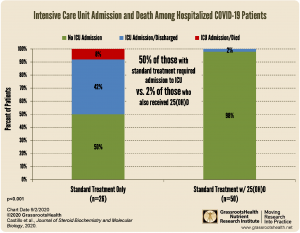 The first Randomized Controlled Trial on vitamin D and COVID-19 has shown a 96% lower risk of ICU admission for those receiving vitamin D (as 25(OH)D to quickly boost vitamin D blood levels) along with the standard treatment, compared to those receiving standard treatment alone.
The first Randomized Controlled Trial on vitamin D and COVID-19 has shown a 96% lower risk of ICU admission for those receiving vitamin D (as 25(OH)D to quickly boost vitamin D blood levels) along with the standard treatment, compared to those receiving standard treatment alone.
These results support many previous observational studies showing a relationship between vitamin D levels and intake and COVID-19 severity.
Review the Latest Nutrient Research for COVID-19
GrassrootsHealth Nutrient Research Institute has launched the new Immune Boost project with the use of our myData-myAnswers nutrient health system that nearly 15,000 people are already using for their health. Specific markers that influence immune health are suggested for testing as part of this project including:
- Vitamin D
- Omega-3 Index
- Essential elements magnesium, selenium, and zinc
- hsCRP
Our goal is to demonstrate how one can use the Nutrient Research Model established by Dr. Robert Heaney to show the effect of vitamin D serum levels of at least 40 ng/ml (100 nmol/L) on risk reduction for all ethnicities in the population. Status and intake of other nutrients will also be analyzed for any type of relationship to immune status and symptom severity. Join the project today!
Please let us know if you’re interested in helping sponsor this project.
Through GrassrootsHealth Nutrient Research Institute, you can also test your essential elements magnesium, copper, zinc and selenium, toxins such as lead, mercury and cadmium, as well as your omega-3 levels, inflammation levels and thyroid stimulating hormone (TSH) level. Find out your levels today! Log on to the test selection page (click the link below) to get your tests and see for yourself if your levels can be improved.
Make sure you track your results before and after, about every 6 months!
Click Here to Access the Test Page
How can I track my nutrient intake and levels over time?
To help you track your supplement use and nutrient levels, GrassrootsHealth has created the Personal Health Nutrient Decision System called
For each specific supplement, you can track what days you take it, how much, and many other details. This will help you know your true supplemental intake and what patterns of use work for you to reach and maintain optimum nutrient levels. Check it out today!


